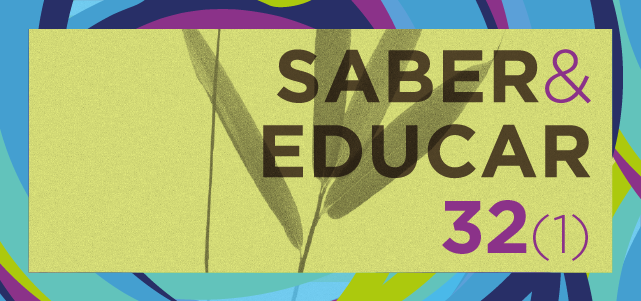Making children's perspectives matter
a qualitative approach to children's point of view when playing
DOI:
https://doi.org/10.25767/se.v32i1.31666Palavras-chave:
children, toys, play, educationResumo
This is a qualitative, exploratory research aimed at understanding child's narratives on play. Based on a review of the literature on play and the contexts surrounding childhood, it was methodologically designed to use in interviews with 4- and 5-year-old children in four childhood education settings, in Porto, Portugal, listening to their opinions on their own experiences and opportunities to engage in play. It was also decided to keep observation records of their behaviour in play situations and to analyse children's productions (drawings) that would reflect their expression about playing. The results showed that there seems to be a clear notion on the part of the child of what play and the use of toys are. For the child, the act of playing does not necessarily imply the use of toys; it seems to be more related to the action itself and the activity. This perspective may clash with the conceptions that adults have about playing. This study provides 10 recommendations for intervention in Early Childhood Education.
Referências
Amado, J. (2017). Manual de Investigação qualitativa em educação. Imprensa da Universidade de Coimbra. https://doi.org/10.14195/978-989-26-1390-1
Czarniawska, B. (2004). Narratives in Social Science Research: Introducing Qualitative Methods. Sage Publications.
Gaskins, S., Haight, W., & Lancy, D. (2007). The cultural construction of play. In A. Göncü & S. Gaskins (Eds.), Play and Development: Evolutionary, Sociocultural, and Functional Perspectives (pp. 179-202). Laurence Erlbaum Associates Publishers. https://www.researchgate.net/publication/284762775_The_cultural_construction_of_play
Graham, A., Powell, M. A., Anderson, D., Fitzgerald, R., & Taylor, N. J. (2013). Ethical research involving children. UNICEF Office of Research-Innocenti.
Göncü, A., Jain, J., & Tuermer, U. (2006). Children’s play as cultural interpretation. In A. Göncü & S. Gaskins (Eds.), Play and development: Evolutionary, sociocultural, and functional perspectives (pp. 155–178). Lawrence Erlbaum Associates Publishers. https://psycnet.apa.org/record/2007-04529-007
Gosso, Y. (2010). Play in different cultures. In P. Smith (Ed.), Children and Play (pp. 80-98). Wiley Blackwell.
Holmes, R. H. (2011). Adult Attitudes and Beliefs Regarding Play on Lãna’I. The Strong. American Journal of Play, 3(3), 356-384.
Holmes, R. M. (2013). Children's play and culture. Scholarpedia, 8 (6), 31016. http://dx.doi.org/10.4249/scholarpedia.31016
Hong, T., Kim, H., Jeun, W. (2016). A Study on What Makes Young Children Happy. Asia-Pacific Journal of Research in Early Childhood Education. 10(2) 47-70. http://dx.doi.org/10.17206/apjrece.2016.10.2.47
Kishimoto, T. M. (2011). Apresentação: cultura como meta John Dewey. Pro-Posições, 22(2), 209-213. https://doi.org/10.1590/S0103-73072011000200014
Lancy, D. (2016). Ethnographic Perspectives on Culture Acquisition. In C. L. Meehan & A. Crittenden (Eds.), Childhood: Origins, Evolution, and Implications (pp. 173–195). University of New Mexico Press.
Lancy, F. D. (2020). Child helpers: A Multidisciplinary Perspective. Cambridge: Cambridge University Press.
Lester, S. & Russell, W. (2010). Children’s right to play: An examination of the importance of play in the lives of children worldwide. Bernard van Leer Foundation. https://www.researchgate.net/publication/263087157_Children%27s_Right_to_Play_An_Examination_of_the_Importance_of_Play_in_the_Lives_of_Children_Worldwide
Mäkitalo, S. (2016). On the notion of agency in studies of interaction and learning. Learning, Culture and Social Interaction, 10, 64–67. https://doi.org/10.1016/j.lcsi.2016.07.003
Mesquita, C. (2020). A investigação com crianças: a exigência de uma ética fundada em direitos. Cadernos de Educação de Infância (120), 77-82.
Mouritsen, F. (1998). Child culture - Play culture. In J. Guldberg, F. Mouritsen & T. K. Marker (Eds.). Working Paper 2. Child and Youth. Culture. Odense, Denmark: Odense University Printing Office.
Pramling, A., Fink, A. T., & Piton, M. R. G. (2016). Brincar: Reflexões a partir da neurociência para a consolidação da prática lúdica na educação infantil. Revista HISTEDBR On-Line, 15(66), 278-294. https://doi.org/10.20396/rho.v15i66.8643715
Pramling, N., Wallerstedt, C., Lagerlöf, P., Björklund, C., Kultti, A., Palmér, H., Magnusson, M., Thulin, S., Jonsson, A., Pramling Samuelsson, I (2019). Play-Responsive teaching in Early Childhood Education. Springer. https://doi.org/10.1007/978-3-030-15958-0
Pramling Samuelsson, I. & Björklund, C. (2022). The relation of play and learning empirically studied and conceptualised. International Journal of Early Years Education. https://doi.org/10.1080/09669760.2022.2079075
Ribeiro, J. (2021). O incontornável dilema da coleta de dados. In P. Sá, A. P. Costa, A. Moreira (Org.). Reflexões em torno de Metodologias de Investigação: recolha de dados. UA. https://doi.org/10.34624/ka02-fq42
Salamone, F., & Salamone, V. (1991). Children’s games in Nigeria redux: A consideration of the “uses” of play. Play & Culture, 4(2), 129-138
Toeplitz-Winiewska, M. (2007). Development Stages and Methods of Interviewing Children.Warsow University.
UNICEF. (2019). Convenção sobre os Direitos da Criança e Protocolos Facultativos. Comité Português para a UNICEF.
https://www.unicef.pt/media/2766/unicef_convenc-a-o_dos_direitos_da_crianca.pdf
Veraksa, N., Pramling Samuelsson, I. & Colliver, Y. (2022). Editorial: Early child development in play and education: A cultural-historical paradigm. Frontiers in Psychology. 13:968473. https://doi.org/10.3389/fpsyg.2022.968473
Downloads
Publicado
Como Citar
Edição
Secção
Licença
Direitos de Autor (c) 2023 Brigite Silva, Ana Pinheiro, Clara Craveiro, Paula Medeiros

Este trabalho encontra-se publicado com a Licença Internacional Creative Commons Atribuição-NãoComercial-CompartilhaIgual 4.0.
Os autores mantêm os direitos de autor e concedem à Saber & Educar o direito de primeira publicação, com o trabalho simultaneamente licenciado sob a Licença Creative Commons Attribution 4.0 International (CC BY 4.0) que permite que outros partilhem, adaptem e redistribuam o trabalhopara qualquer finalidade, inclusive comercial, desde que seja dado o devido crédito à autoria e à publicação inicial nesta revista.
A revista reserva o direito de efetuar, nos originais, alterações de ordem normativa, ortográfica e gramatical, com vista a manter o padrão culto da língua, respeitando, porém, o estilo dos autores.
As opiniões emitidas pelos autores dos artigos são da sua exclusiva responsabilidade.
A submissão de artigos a esta revista não contempla qualquer pagamento ou taxa.
Autores têm permissão e são estimulados a publicar e distribuir o seu trabalho online (por exemplo, em repositórios institucionais ou páginas pessoais),pois isso pode aumentar o impacto e a citação do trabalho publicado (Ver O Efeito do Acesso Livre).
Os nomes e endereços fornecidos nesta revista serão usados exclusivamente para os serviços prestados por esta publicação, não sendo divulgados para outras finalidades ou a terceiros.
Legislação aplicável: Política de Proteção de Dados






